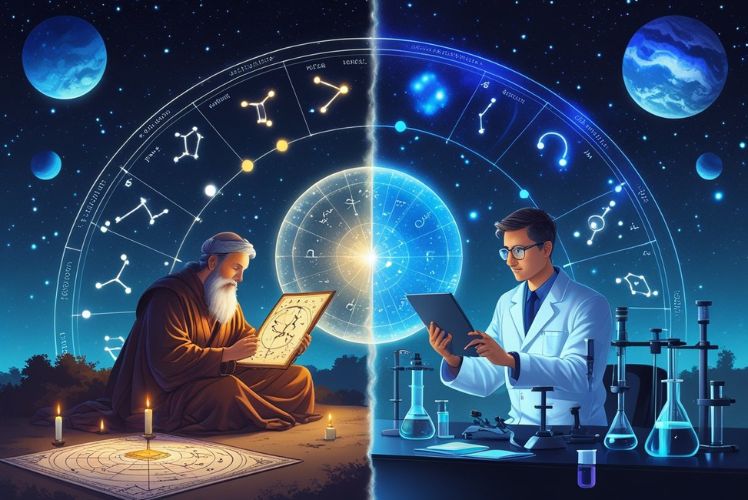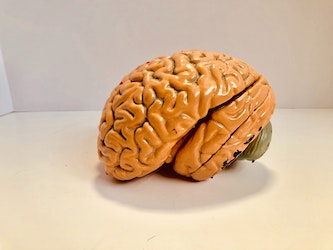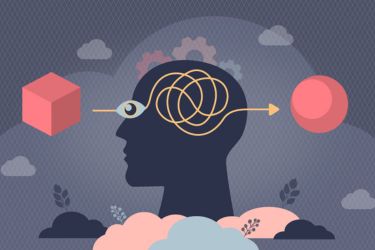Astrology has fascinated people for thousands of years, blending cultural traditions, personal beliefs, and celestial events into a complex practice. Many of us have checked our horoscopes, wondered about our star signs, or debated how much the positions of the planets affect daily life. Scientific research, however, shows that there is no proven connection between astrology and personal traits or future events.

Despite its popularity, astrology is not recognised as a science by the scientific community. Science relies on evidence, experiments, and repeatable results, while astrology depends on belief systems and symbolic meanings. Still, the cultural impact of astrology continues to shape how we view ourselves and our relationships with the cosmos.
Key Takeaways
- Astrology is popular but lacks scientific evidence.
- Science and astrology have different methods and goals.
- Cultural interest in astrology remains strong despite scientific scepticism.
Understanding Astrology and Science

Astrology and science have shaped how we look at the world and ourselves. By exploring their definitions and historical roots, we can see how their goals and methods set them apart.
Definitions and Core Principles
Astrology is a belief system that links human events and personality traits to the positions of celestial bodies. The main idea is that planets, the Sun, and the Moon influence personal traits and life events.
Science, by contrast, is built on systematic observation, evidence, and testing. It relies on experiments and repeated results to learn about the natural world. Astronomy, a branch of science, studies celestial bodies such as stars and planets, but it does not claim these objects affect human lives in the way astrology does.
Let’s look at a simple comparison:
| Astrology | Science | |
|---|---|---|
| Based on | Belief, tradition | Observation, evidence |
| Methods | Horoscopes, star charts | Experiments, testing |
| Goal | Predict or explain life events | Understand natural laws |
While astrology depends on symbolic meanings and tradition, science values evidence that can be tested and proved.
Historical Foundations
Astrology has existed for thousands of years, appearing in ancient cultures such as Egypt, Greece, China, and Mesopotamia. In early history, there was little difference between astrology and astronomy; they both studied the stars to find meaning.
Over time, the two fields split apart. Astronomy became a science, focused on the physical properties and movements of celestial bodies. It uses maths and physics to explain phenomena like orbits and light.
Astrology remained tied to spiritual and personal interpretation. As scientific methods became more precise, astrology lost favour in academic circles, but it stayed popular in society. Today, science and astrology are very different in both approach and purpose, but both remain linked by their shared origins in sky-watching.
Astrology Versus Science: Key Differences

When we compare astrology and science, we see major contrasts in how each works, the kind of results they offer, and the standards they use to judge truth. These differences are clear in their methods, accuracy, and reliance on evidence.
Methodologies and Approaches
Astrology is based on beliefs that the positions and movements of celestial bodies can influence or reflect personal traits and events. Astrologers use birth charts and patterns from tradition to make interpretations.
Science relies on systematic observation, questioning, and the scientific method. Experiments and data are used to test ideas. Results must be consistent and repeatable, so others can check and confirm findings.
We find that astrology leans on subjective interpretations and past teachings, while science demands objective observation and logical testing. The tools and goals are different—astrology looks for meaning and patterns that may feel personal, while science tries to explain and predict the natural world using facts.
Table: Core Differences
| Aspect | Astrology | Science |
|---|---|---|
| Foundation | Tradition & Belief | Empirical Evidence |
| Method | Interpretation | Experimentation |
| Tools | Charts, Intuition | Data, Instruments |
Predictive Claims and Accuracy
Astrology makes many claims about the future, such as horoscopes forecasting personal events or moods. These predictions are based on astrological patterns, but their accuracy is debated.
Scientific predictions depend on tested theories and observed trends. The accuracy of scientific predictions can be measured and checked by others. For example, weather forecasts rely on data from past weather patterns, collected and analysed over time.
Astrological predictions often lack the ability to be verified. Studies have shown that their accuracy is no better than chance. Scientific predictions, however, can be supported or disproven by real-world results and further testing.
Empirical Standards
Science demands empirical evidence—facts gained through careful observation, measurement, and repeatable experiments. This standard lets us test, judge, and refine ideas based on what actually happens.
Astrology often uses personal experiences or stories as support. These are not systematic and cannot be tested in the same way scientific results can. The lack of empirical standards means astrology's claims cannot be universally proven or disproven.
Here, the main difference is clear: science values evidence others can check, while astrology relies on subjective accounts and tradition. Our trust in science grows from its commitment to facts and the real world, not just belief.
Scientific Evaluation of Astrology

Astrology has long claimed to predict personality and events through celestial positions. We need to examine how science has tested these claims using evidence, experiments, and critical thinking.
Scientific Studies on Astrology
Over the past century, many scientific studies have explored astrology. Researchers have looked at whether astrological forecasts match real-life outcomes. Results from controlled experiments and double-blind studies often show that astrologers do not perform better than chance when making personality or event predictions.
A famous test involved astrologers trying to match birth charts to psychological profiles. In most cases, their accuracy did not exceed random guessing.
Some early studies suggested small links between birth dates and certain traits. However, later and larger studies failed to confirm these effects. Most scientists agree that astrology does not stand up under repeated, careful testing.
Correlation and Causation Investigations
Many people notice coincidences between astrological predictions and actual events. However, scientific analysis requires us to separate correlation (when two things occur together) from causation (when one causes the other).
Studies have used statistical methods to check if birth dates or times are linked to personality, health, or life events. Most findings show no consistent or meaningful correlation. This suggests that astrology does not have a causal effect on people’s traits or futures.
In addition, the “Barnum effect” helps explain why some see truth in astrological descriptions. This effect happens when people believe vague or general statements apply to them personally.
Notable Research and Findings
Significant research, such as studies led by Shawn Carlson and others, has tried to test astrology in rigorous ways. Carlson’s double-blind experiment in 1985, published in the journal Nature, asked astrologers to match people’s natal charts with detailed personality inventories.
The result was clear: astrologers’ matches did not improve on chance. Other researchers, like Dr Percy Seymour, have proposed alternative ideas about how cosmic forces might link to biology, but these claims have not gained wide scientific support.
A large review of past studies finds no reliable evidence that astrology can predict personality traits or life events. Most scientific bodies and journals reject astrology as having any scientific basis.
Birth Charts, Zodiac Signs, and Personality Research

Astrology links birth charts and zodiac signs to aspects of our individual personalities. Many wonder if science supports any real connection between these astrological systems and personality traits.
Role of Birth Charts and Astrological Charts
A birth chart, also called a natal chart, maps the exact positions of the planets, Sun, and Moon at our time of birth. Astrological charts use this information to create personalised readings.
In Western astrology, the birth chart divides the sky into twelve sections, each representing a zodiac sign. Astrologers say that the combination of planets in these signs shapes our character and life events.
Creating a birth chart requires our birth date, time, and place. This level of detail leads many people to believe that astrological charts are unique and meaningful. However, the process relies on symbolic interpretations, not proven scientific methods.
Personality Traits and the Zodiac
Astrology claims each zodiac sign has distinct personality traits. For example, Aries are often described as bold, while Cancers are thought to be sensitive. These character profiles are widely shared in horoscopes.
Several large-scale studies have tested if people born under the same zodiac sign have similar personalities. Researchers have used standard personality tests, such as the Big Five, to compare traits among different signs.
Results have found no significant link between zodiac signs and personality. People do not show meaningful similarities or differences based simply on their sign. Even people born within minutes of each other with nearly identical birth charts display a wide range of personalities.
Assessing Predictive Validity
For astrology to have scientific value, it must make accurate predictions about personality or behaviour. Researchers have tested if astrologers can match birth charts with real personality profiles better than chance.
In controlled studies, astrologers failed to correctly identify personality traits using only birth charts. The results suggest astrological predictions do not work reliably.
When tested with large groups, astrology does not outperform random guessing. Many scientists see astrology as a belief system, not a rigorous method for predicting personality or events. The current scientific consensus is that astrology does not have predictive validity when assessed alongside established psychological testing.
Psychological Factors in Astrological Belief
Our understanding of why people believe in astrology often comes from psychology. Several specific thinking patterns and mental shortcuts play a role, shaping how we view astrological claims and predictions.
Confirmation Bias and Subjective Validation
Confirmation bias is a psychological tendency where we seek out or remember information that supports what we already believe. In astrology, this means we often remember horoscopes that seem accurate and forget the ones that are not.
People also use subjective validation. This is when we accept vague statements as personally meaningful if we believe they apply to us. For example, if a horoscope predicts "a challenging week," we may focus on small difficulties and ignore the times when things went well.
These patterns lead us to trust astrological predictions more than we should. We usually do not notice how much our own thinking influences what we believe about astrology.
The Barnum Effect Explained
The Barnum Effect refers to our tendency to accept general, broad statements as being tailored to us personally. Many astrological readings use language that feels unique but is actually true for almost anyone.
Statements like "You have a great need for other people to like you" are common and could fit most of us. We see these statements as accurate because they are positive, relatable, and speak to universal experiences.
In a table, it looks like this:
| Astrological Statement | Applies Broadly? |
|---|---|
| "You sometimes doubt your decisions." | Yes |
| "You value honesty but sometimes avoid conflict." | Yes |
| "You are capable of great things." | Yes |
When we recognise how the Barnum Effect works, we can better understand why astrological claims appear convincing even when they lack any real evidence.
Astrology and Astronomy: Divergence and Connections
Astrology and astronomy both study celestial bodies, but their purpose and methods are different. The two fields were once closely connected, but they now play very separate roles in how we understand the cosmos and ourselves.
Separation of Disciplines
Historically, astrology and astronomy were almost the same field. Early civilisations, such as the Babylonians, watched the stars to predict events and seasons.
Over time, astronomy became a science focused on the physical properties, movement, and origins of celestial bodies. We now use telescopes, mathematics, and observation to study the universe and gather evidence.
In contrast, astrology looks for patterns in the positions of planets and stars, claiming that these can guide human life. Astronomy is recognised as a science, but astrology is considered a belief system, sometimes called a pseudoscience.
Today, the main difference is that astronomy aims to explain how the universe works, while astrology tries to find meaning behind celestial events.
| Discipline | Main Focus | Method | Classification |
|---|---|---|---|
| Astronomy | Physical universe | Scientific study | Science |
| Astrology | Human experience | Symbolic meaning | Spiritual/Tradition |
Astrology’s Ongoing Relationship with Astronomy
Even as they separated, astrology kept using knowledge from astronomy. Astrologers depend on accurate positions of the sun, moon, and planets, data which comes from astronomers' calculations.
We see this in the creation of horoscopes, which require the real positions of celestial bodies at specific times. Without astronomy, astrology could not function as it does today.
Astrology also uses names and divisions from astronomy, such as the twelve zodiac constellations. These names are originally based on patterns seen and mapped by astronomers throughout history.
Although astronomy focuses on facts and evidence, and astrology focuses on meaning and belief, the two remain linked through their shared interest in the sky and use of celestial knowledge.
Frequently Asked Questions
We often hear questions about the scientific status of astrology, its main focus, differences from religion, and its ability to predict things like marriage compatibility. Here, we address these topics directly using clear and reliable information.
Can astrology be categorised as a science?
Astrology is not classified as a science by the scientific community. While astrology uses charts, dates, and calculations similar to some scientific methods, it does not meet the standards of scientific testing and evidence.
Modern science relies on experiments, repeated results, and clear proof. Astrology mainly uses symbolic meanings and interpretations, which cannot be tested or measured in a lab.
What reasons support the view that astrology is not scientific?
The main reason astrology is not considered scientific is that its predictions and explanations are not consistent or testable. Scientific theories must be supported by evidence that can be observed and checked by others.
Astrological claims often change from one practitioner to another. There is no reliable way to prove or disprove most astrological ideas through scientific methods.
How is astrology defined?
Astrology is the study of how the positions and movements of planets, stars, and other celestial bodies may influence human life and events on Earth. It often involves creating charts, called horoscopes, based on a person’s birth date and time.
Astrologers interpret these charts to give information about personality, potential, or future events. The practice has deep historical roots, but its methods are not based on science.
Does astrology hold any truth in predicting marital compatibility?
Some people look to astrology for advice about marriage or relationships. Astrologers compare birth charts to suggest if two people might get along well.
However, there is no scientific proof that astrology can reliably predict how successful a marriage or partnership will be. Choices about relationships are influenced by many factors outside of astrology.
What subject area does astrology primarily concern itself with?
Astrology’s main focus is the relationship between human events and the positions of celestial bodies, such as planets and stars. It seeks to use these positions as a way to interpret or predict aspects of life.
It is mainly used for personal advice, making predictions, or seeking meaning in day-to-day life.
In what ways is astrology considered distinct from organised religious systems?
Astrology is not an organised religion. It does not have a central scripture, required beliefs, or rituals that followers must perform. People of many different faiths or none at all may practise astrology.
Unlike religions, astrology does not involve worship or a focus on moral teachings. Its purpose is more about individual guidance rather than group worship or community rules.





















